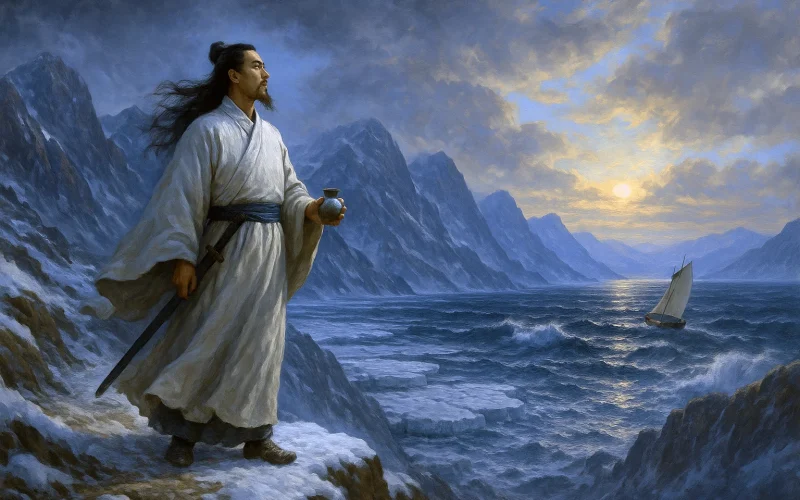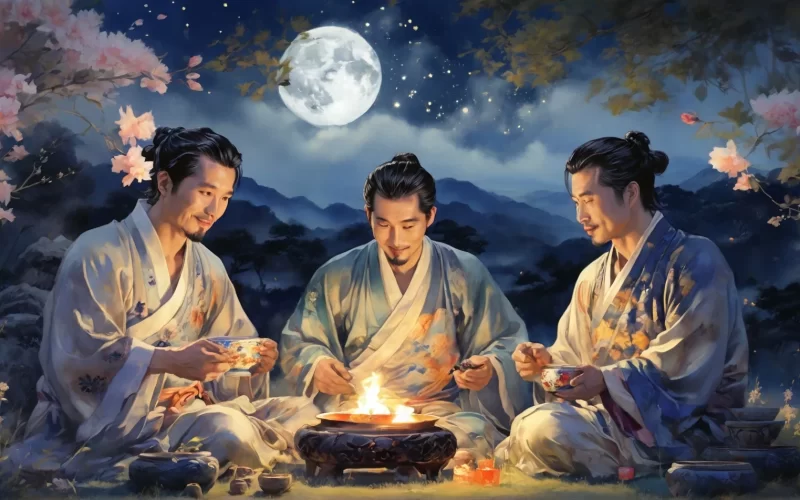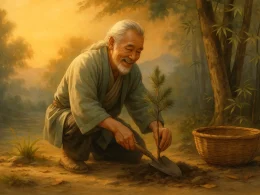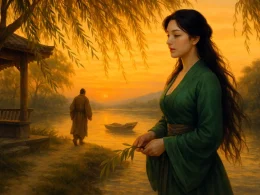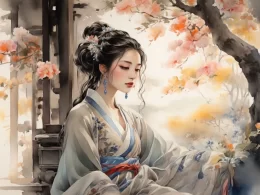Pure wine costs, for the golden cup, ten thousand coppers a flagon,
And a jade plate of dainty food calls for a million coins.
I fling aside my food-sticks and cup, I cannot eat nor drink
I pull out my dagger, I peer four ways in vain.
I would cross the Yellow River, but ice chokes the ferry;
I would climb the T'ai-hang Mountains, but the sky is blind with snow...
I would sit and poise a fishing-pole, lazy by a brook -
But I suddenly dream of riding a boat, sailing for the sun
Journeying is hard,
Journeying is hard.
There are many turnings -
Which am I to follow? ...
I will mount a long wind some day and break the heavy waves
And set my cloudy sail straight and bridge the deep, deep sea.
Original Poem
「行路难 · 其一」
李白
金樽清酒斗十千,玉盘珍羞值万钱。
停杯投箸不能食,拔剑四顾心茫然。
欲渡黄河冰塞川,将登太行雪满山。
闲来垂钓碧溪上,忽复乘舟梦日边。
行路难,行路难!多歧路,今安在?
长风破浪会有时,直挂云帆济沧海。
Interpretation
This poem is the first of a three-poem series composed after Li Bai suffered political setbacks in Chang'an, where he fell victim to slanderous accusations. Written in 744 CE upon his departure from the capital, the work adapts an old Han-dynasty Music Bureau title. It expresses profound frustration over official roadblocks and anguish over unfulfilled ambitions, while simultaneously demonstrating the poet's indomitable spirit. Blending deep disappointment with resilient hope, the poem portrays a talented but unrecognized poet grappling with adversity yet maintaining grand aspirations.
First Couplet: "金樽清酒斗十千,玉盘珍羞值万钱。"
Jīn zūn qīng jiǔ dǒu shí qiān, yù pán zhēn xiū zhí wàn qián.
Gold cups hold fine wine worth thousands in price; Jade plates carry rare delicacies, no less nice.
This couplet paints a luxurious banquet scene that appears celebratory but actually establishes a stark contrast with the poet's inner melancholy. The exquisite food and drink that should evoke joy instead foreshadow the distress that follows. For international readers: The phrase "worth thousands" employs literary exaggeration—similar to saying "a bottle worth a fortune"—to emphasize the feast's premium quality, thereby heightening the contrast with the poet's subsequent inability to enjoy it.
Second Couplet: "停杯投箸不能食,拔剑四顾心茫然。"
Tíng bēi tóu zhù bùnéng shí, bá jiàn sì gù xīn mángrán.
I set aside my cup and discard my chopsticks, unable to eat; Drawing my sword, I gaze around, my heart lost and incomplete.
Facing delicacies, the poet finds no appetite due to overwhelming sorrow. "Drawing my sword" expresses both his frustration and helplessness, symbolizing his search for—and ultimate failure to find—an escape from his predicament. Chopsticks represent essential dining utensils in Chinese and East Asian culture. For Tang scholars like Li Bai, a sword symbolized not merely a weapon but ambition to achieve greatness. Thus "drawing my sword" signals readiness for action, yet not knowing where to direct this action highlights a profound sense of wasted power.
Third Couplet: "欲渡黄河冰塞川,将登太行雪满山。"
Yù dù Huáng Hé bīng sè chuān, jiāng dēng Tài háng xuě mǎn shān.
I'd cross the Yellow River, but ice blocks the stream; I'd climb Taihang Mountains, but snow thwarts the dream.
The poet employs highly symbolic natural imagery to metaphorize his career obstacles. The frozen river and snow-clogged mountains represent completely blocked paths to his ideals. The Yellow River functions as China's "mother river," while Taihang represents a significant northern mountain range—both are culturally and geographically iconic. By selecting these grand images, Li Bai conveys that all routes, whether northward or eastward, are thoroughly sealed, indicating a comprehensive and inescapable predicament.
Fourth Couplet: "闲来垂钓碧溪上,忽复乘舟梦日边。"
Xián lái chuí diào bì xī shàng, hū fù chéng zhōu mèng rì biān.
At leisure, I fish by blue streams, a solitary figure; Suddenly, I dream of sailing by the sun, a vision much bigger.
This couplet alludes to historical figures to express the poet's lingering hopes. "Fishing by blue streams" refers to Jiang Ziya, who fished in seclusion before assisting King Wu of Zhou; "dreaming of sailing by the sun" alludes to Yi Yin, who dreamed of reaching the sun before helping found the Shang dynasty. These allusions demonstrate the poet's hope to emulate ancient worthies in encountering a wise ruler. These historical references serve as spiritual anchors amid despair, comparing his current stagnation to the incubation periods of ancient sages. However, the word "suddenly" reveals the fragility of this hope, wavering between historical optimism and present reality.
Fifth Couplet: "行路难,行路难!多歧路,今安在?"
Xíng lù nán, xíng lù nán! Duō qí lù, jīn ān zài?
Hard the road, hard the road! Many forks—where's the code?
This couplet forms the emotional climax of the poem. The duplication of "hard the road" intensifies the expression of confusion and uncertainty amid career obstacles. This cry holds universal resonance—anyone standing at life's crossroads can relate. It elevates specific career frustrations to philosophical questioning of life's direction.
Sixth Couplet: "长风破浪会有时,直挂云帆济沧海。"
Cháng fēng pò làng huì yǒu shí, zhí guà yún fān jì cāng hǎi.
I'll ride the wind and break waves one day, I'm certain; Hoist cloud-like sails to cross the sea, drawing back the curtain.
These lines adapt the famous declaration by Southern Dynasty statesman Zong Que: "I shall ride the wind and break through the waves." They demonstrate the poet's refusal to submit to fate. Despite present adversity, he maintains unwavering belief that he will ultimately overcome obstacles and realize his ideals. This triumphant conclusion achieves a magnificent emotional leap after all the preceding melancholy, hesitation, and inner turmoil. The vision of "crossing the sea" reveals ambitions that transcend mere official positions, envisioning an ocean-like scope of achievement that reflects the vastness of his aspirations.
Holistic Appreciation
Through powerful emotional fluctuations, the poem traces the poet's psychological journey from confusion and frustration to determined resolve. The emotional progression—resembling a symphony moving from a somber adagio through intense conflict to an ultimately triumphant finale—creates a compelling artistic impact. The poet initially cannot enjoy fine food and drink due to inner distress; then "ice-blocked river" and "snow-clogged mountains" symbolize career obstructions; historical allusions express lingering hope; finally, "riding the wind and breaking waves" concludes with heroic optimism.
Artistic Merits
- Vivid Analogical Imagery: Using "frozen Yellow River" and "snow-covered Taihang Mountains" to symbolize life's hardships makes abstract emotions visually concrete and impactful.
- Meaningful Historical Allusions: References to figures like Jiang Ziya and Yi Yin deepen the poetic meaning while reflecting persistence in pursuing ideals. These allusions embed personal sentiment within grand historical narratives, adding profound weight to the poem.
- Layered Emotional Progression: The shift from frustration and confusion to resilience and determination creates dramatic artistic tension. The emotional arc—suppression, further suppression, slight uplift, renewed suppression, and final soaring—culminates in hopeful brilliance emerging from the depths of despair.
- Rhythmic Fluency and Harmonic Sound: The mixture of three-, five-, and seven-character lines creates fluid, musical rhythm. The three-character exclamation "Hard the road!" breaks the conventional seven-character pattern, generating intense rhythmic tension.
Insights
This work transcends Li Bai's personal career setbacks to offer profound reflection on universal human adversity. Through powerful analogies and meaningful allusions, the poet expresses defiance against fate and persistent pursuit of ideals. His emotional turmoil reflects life's complexity, yet the poem concludes with uplifting resolve, conveying faith in "rainbows after storms." It teaches that despite life's thorns and forks, holding onto hope enables eventually "riding the wind and breaking waves" to reach one's destination. The poem perfectly defines "heroism"—recognizing life's truths yet still loving it and believing in overcoming adversity. This spirit transcends time and culture, inspiring people worldwide facing hardship.
Poem translator
Kiang Kanghu
About the poet

Li Bai (李白), 701 - 762 A.D., whose ancestral home was in Gansu, was preceded by Li Guang, a general of the Han Dynasty. Tang poetry is one of the brightest constellations in the history of Chinese literature, and one of the brightest stars is Li Bai.






